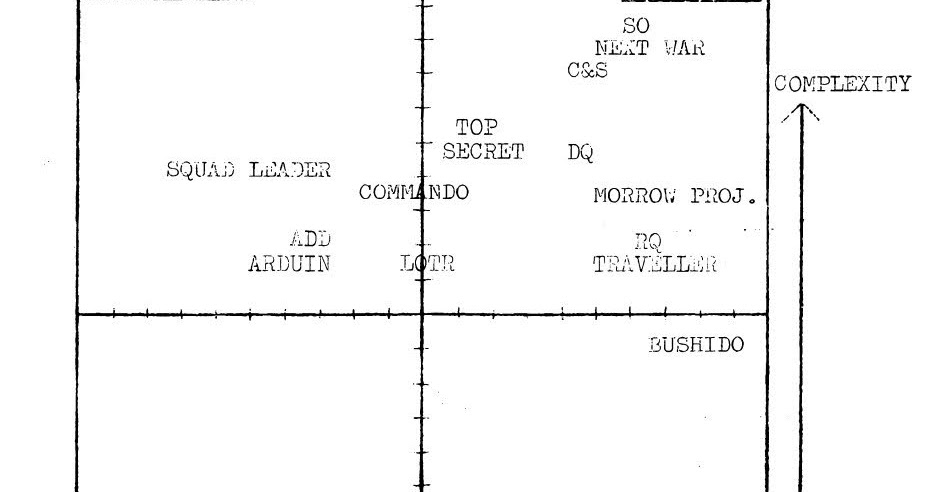Snarf Zagyg said:
As far back as the birth of the hobby, people have argued about whether the system* matters, and whether the first system (or the predominant system) conditions players to approach other systems with certain expectations. In the 70s and early 80s, these arguments were held at tables, in magazines, and at conventions; later, these same arguments were later held via BBS or usenet, still later through various websites and forums (including this one).
Yet, the hobby continues. And the arguments recycle periodically, sometimes given different names, sometimes with enhanced vigor, sometimes with science-y sounding terminology to give cover to the same debate, yet the argument is essentially unchanged.
At a certain point, many gamers move past these scarred theoretical battlefields to concentrate on the joys of actual play.
Does the system matter? Maybe. A little. But not that much.
I'm not really sure what the point is here. Are you arguing that there has been no change or development in RPGing since 1974? If that's not your argument, then what is it?
Do you think designers like Luke Crane and Vincent Baker and Greg Stafford are/were not interested in the joys of actual play?
I have active campaigns in multiple systems - Classic Traveller, MHRP/Cortex+ Heroic, Prince Valiant, Burning Wheel. These are different systems. They produce different play experiences. They are enjoyable in different ways.
It would be strange for an advocate of cinema to argue that
technique doesn't matter. Or to suggest that there's no difference between Star Wars, Manhattan and The Seventh Seal - "they're all just cinema!"
In fiction, there's a difference between (say) LotR, REH Conan and Graham Greene.
In RPGing, I can testify from experience there's a big difference between (say) the essential light-heartedness of Prince Valiant and the demanding "weight" of Burning Wheel. And both are different from Classic Traveller, which in play will reveal relatively little about the characters themeslves and is much more focused on the external world they inhabit.
For the record I think system does matter. Just nowhere near as much as adventure design/story and group.
It has an influence, I just don’t believe it makes as much difference as the designers of those systems would like to believe (to return to the original article)
Because we generally play games that are made by the people who are telling stories that we like. I find Dungeon World utterly unimpressive in that regard. As would my group.
Pathfinder 1e, D&D, WFRP have all released great stories.
most systems have an element of pre-written stories whether by a GM or publisher. There is a reason for that.
I don't know what the basis is for your quantitative claim.
But anyway, the whole notion of
adventure design and
telling stories is something that is system-dependent, so you've already shown that system
does matter. None of the games I've mentioned in this post, as played by my group, involve
designed adventures or
released great stories. And none of them, played as written, will support such things. (MHRP claims to, but there is a huge tension between that claim and the actual resolution procedures - you would have to just ignore these procedures to get the game to fit into a designed adventure.)
I would also add: my active games are all with the same group. The differences between them aren't driven by the group, they're driven by the systems.
Here are some simple differences that matter:
* Classic Traveller has almost no mechanics that pick up on, or respond to, or affect, the commitments or "inner life" of the character;
* MHRP/Cortex+ Heroic does not incorporate fictional positioning into resolution unless the participants make the effort, as part of the resolution process, to bring it under the umbrella of mechanics. This produces a feeling of "setting as backdrop" which from time to time gets starkly foregrounded - it was invented for super hero play, but I think also works well for JRRT;
* In Prince Valiant, "damage" taken simply results - as a mechanical matter - in incapacitation. It is always up to the GM to decide what, in the fiction, follows from that incapacitation, and hence how serious it is and how long it takes to heal. As a general rule, therefore, there is no PC death unless the fictional positioning absolutely demands it (eg the damage results from falling a great height or being swallowed by a dragon or something similar);
* In Burning Wheel failure rates can be in excess of 50% - this is one cause of the feeling of "weight" or "oppression" punctuated by occasional victory that is (in my view) a hallmark of BW play.
None of these games will produce a 5e D&D-like play experience.

 playingattheworld.blogspot.com
playingattheworld.blogspot.com





